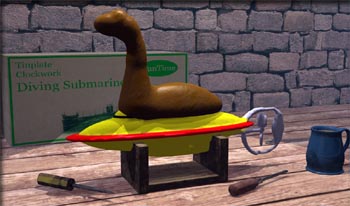The Surgeon's Hoax The most famous picture of the Loch Ness Monster, a grainy black and white photograph showing a long head and neck emerging from the lake, turned out to be a hoax. In 1993, Christian Spurling, stepson of the flamboyant movie maker and big game hunter "Duke" Wetherell, admitted he'd made the "monster" out of some plastic and a clockwork, tinplate, toy submarine. The picture (Often referred to as the "Surgeon's Photograph," because Colonel Robert Kenneth Wilson, a physician, claimed to had taken it by the Loch in April of 1934) had withstood careful scientific examination. Monster fans had speculated that the pictures showed a plesiosaur, while skeptics said it must have been an otter head or tree trunk. Nobody seems to have suspected it was actually a toy submarine. Tracking Down the Story According to two Loch Ness researchers, David Martin and Alastair Boyd, in 1993 they'd heard Wetherell's son, Ian, in a 1975 article, had alleged that his father had faked one of the "Nessie" photographs. A couple of things seem to ring true about his statement. First he named Maurice Chambers as a part of the conspiracy. This was the very man Wilson had said he was going to visit the day he took photo. Also Ian Wetherell had mentioned that some of the photos taken that had been included the far shoreline in the image. Since, with only one exception, every version of the published pictures had the shoreline cropped out, it seemed likely that Ian only knew about it because he'd been there when the photo was taken. Since by then Ian Wetherell was dead, the two men decided to talk to Ian's stepbrother, Christian Spurling. When Martin and Boyd visited him, Spurling, then 93, admitted he'd been approached by Duke Wetherell to build a fake monster. Duke Wetherell apparently concocted the plan as revenge upon the London Daily Mail newspaper. In 1933 the Daily Mail had hired Wetherell to find the Loch Ness Monster. Soon after arriving at the lake Wetherell found some strange tracks of a four-toed creature in the soft mud near the water. Wetherell estimated that whatever left the tracks must be twenty feet in length. Plaster casts were taken and sent to the London Museum of Natural History. While the world awaited the Museum's analysis, however, hundreds of monster hunters and tourists showed up at the Loch. Unfortunately after a few weeks the Museum announced that the tracks were not that of an unknown monster, but those of a hippo. Apparently Wetherell himself had been hoaxed. The dried foot used to make the print was probably part of an umbrella stand or ash tray. The Daily Mail was angered at Wetherell and ridiculed and humiliated him. Wetherell's Revenge It was soon after this that Spurling, who was a model-maker by trade, was approached by his stepfather to build the "beast." Construction was done with plastic wood over the conning tower of the toy submarine he'd purchased. The neck, estimated by some from the photograph to be over three feet high, actually measured between 8 and 12 inches. "We'll give them their monster," Duke told his son. Ian Wetherell and his father took the completed contraption and a camera to the Loch and photographed it on a quiet bay, then sank the evidence in the mud at the edge of the lake. The undeveloped film was then passed to Chambers and on to Colonel Wilson, who had them developed. He then sold them photo to the Daily Mail. The conspirators were quite unprepared for the publicity the photo generated and apparently decided not to admit the hoax. The story stayed unknown for over sixty years. Not everyone thinks that the photo is a fake. Some have questioned why Martin and Boyd waited to announce the story until Spurling was dead, making it impossible for others to question him. As far as the beast itself goes, not even Boyd thinks that the end of the Surgeon's photo is the end of the Loch Ness Monster. Boyd, who has seen the creature himself, remains a believer.
Copyright Lee Krystek 1996-2011. All Rights Reserved. |


